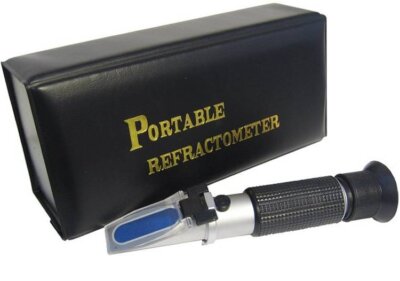
In the veterinary laboratory or out in the field, the handheld veterinary refractometer is a compact and effective diagnostic aid for detecting early indications of diseases including Feline Infectious Peritonitis (FIPV) and Chronic Kidney Disease (CKD).
In other professions, this pocket-sized instrument is used to determine salinity, sugar content, the concentration of industrial coolants, anti-freeze and even the quality of gemstones. In veterinary medicine, the device is readily applied to the measurement of protein in serum, plasma or abdominal fluid, or the specific gravity of a urine sample.
Using a handheld veterinary refractometer is simple
Transparent materials influence the speed and at which light travels through them. Light rays travelling in a low-density medium, such as air, are slowed and so ‘bent’ off course when they enter a denser medium such as water, glass or solution of dissolved solids. Measuring the angle of bending (refraction) offers a simple means of assessing the density of the medium or the concentration of solids in a solution.
Using a handheld veterinary refractometer is simple. The sample to be measured is introduced between the flip-up glass cover and the underlying glass prism. The semi-opaque ground glass cover, which filters and disperses light evenly through the sample acts as a screen against which the internal calibrations scale is displayed.
Ambient light passes through the sample
Ambient light passing through the sample is deflected at a greater or lesser angle according to the density of the sample. Using distilled water as a ‘zero’ indicator, the point at which deflected light illuminates the scale, viewed through the eyepiece, indicates the relative concentration of dissolved solids in the sample.
Refractive index measurement is a quick and practical aid in the diagnosis of animal diseases where abnormally high or low concentrations of protein, salt or other solutes in an animal’s body fluid are key diagnostic symptoms.
Conditions, where body fluid density measurement can have a critical diagnostic role, include the cat diseases Feline Infectious Peritonitis and Chronic Kidney Disease.
Feline Infectious Peritonitis (FIP) is caused by a strain of Feline Coronavirus (FCoV). Known in the veterinary laboratory Feline Infectious Peritonitis Virus (FIPV), it damages blood vessels (vasculitis) causing fluid to leak into the abdominal and chest cavities. This fluid has an abnormally high protein concentration which is quickly and easily detected by its high refractive index. The FASTest diagnostic test kits for FcoV and FIPV will help confirm the diagnosis.
A handheld veterinary refractometer provides a quick and simple tool to help vets diagnose Chronic Kidney Disease. Screening for changes in Urine Specific Gravity (USG), together with serum creatinine measurement, can help older cats live longer by detecting indications of renal disease before clinical symptoms become apparent.
To find out more about our large range of veterinary products visit our website: www.vetlabsupplies.co.uk or Telephone: 01798 874567

